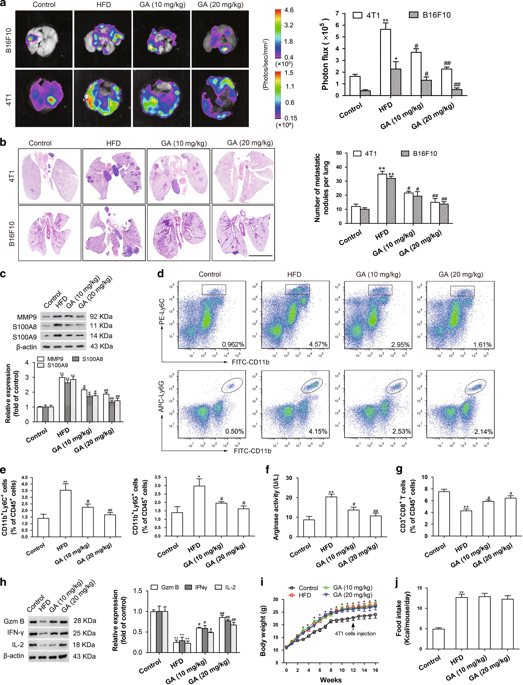Mucosal Immunology ( IF 8 ) Pub Date : 2019-02-12 , DOI: 10.1038/s41385-019-0144-6 Miao Qiu 1 , Keqing Huang 1 , Yanzhuo Liu 1 , Yuqing Yang 2 , Honglin Tang 1 , Xiaoxiao Liu 1 , Chenlong Wang 1 , Honglei Chen 3 , Yu Xiong 4 , Jing Zhang 5 , Jing Yang 1

|
High-fat diet (HFD) promotes lung pre-metastatic niche formation and metastasis. Thus, there is an urgent need to identify the underlying mechanisms and develop strategies to overcome them. Here we demonstrate that glycyrrhizic acid (GA) prevents HFD-enhanced pre-metastatic niche formation and metastasis through gut microbiota. GA reduced HFD-enhanced myeloid-derived suppressor cell recruitment, pro-metastatic protein S100A8/A9 expression and metastasis burden of 4T1 breast cancer and B16F10 melanoma, accompanied by gut microbiota alteration and colonic macrophage polarization far away the M1-like phenotype. These parameters were greatly decreased by treatment with antibiotics, recolonization of Desulfovibrio vulgaris and Clostridium sordellii, and administration of lipopolysaccharide or deoxycholic acid. Macrophage depletion attenuated HFD-enhanced pre-metastatic niche formation and metastasis, but failed to further affect the effects of GA. Mechanistically, counteraction of HFD-enhanced gut microbiota dysbiosis by GA inhibited Gr-1+ myeloid cell migration and S100A8/A9 expression through decreasing the proportion of M1-like macrophages and their production of CCL2 and TNF-α in the colons via LPS/HMGB1/NF-κB signaling inactivation. Together, targeting the gut microbiota by GA to modulate colonic macrophages could be a novel strategy for the prevention of HFD-enhanced pre-metastatic niche formation and metastasis.
中文翻译:

甘草酸调节肠道微生物群可防止高脂肪饮食增强的转移前生态位形成和转移
高脂肪饮食 (HFD) 促进肺转移前生态位形成和转移。因此,迫切需要确定潜在的机制并制定克服这些机制的策略。在这里,我们证明甘草酸 (GA) 通过肠道微生物群阻止 HFD 增强的转移前生态位形成和转移。GA 减少了 HFD 增强的髓源性抑制细胞募集、促转移蛋白 S100A8/A9 表达和 4T1 乳腺癌和 B16F10 黑色素瘤的转移负担,伴随着肠道微生物群的改变和远离 M1 样表型的结肠巨噬细胞极化。这些参数通过抗生素治疗、寻常脱硫弧菌和梭氏梭状芽胞杆菌的重新定殖而大大降低,以及脂多糖或脱氧胆酸的给药。巨噬细胞耗竭减弱了 HFD 增强的转移前生态位形成和转移,但未能进一步影响 GA 的作用。从机制上讲,GA 抵消 HFD 增强的肠道微生物群失调,通过 LPS/HMGB1 减少结肠中 M1 样巨噬细胞的比例及其 CCL2 和 TNF-α 的产生,从而抑制 Gr-1 +骨髓细胞迁移和 S100A8/A9 表达/NF-κB 信号失活。总之,通过 GA 靶向肠道微生物群来调节结肠巨噬细胞可能是预防 HFD 增强的转移前生态位形成和转移的新策略。



























 京公网安备 11010802027423号
京公网安备 11010802027423号